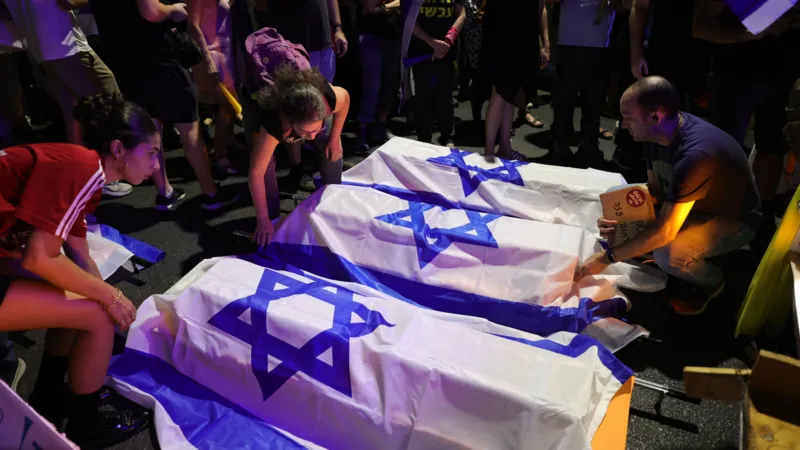An emotional scene unfolded on the streets of Tel Aviv on Monday evening: Protesters marched past Israeli Prime Minister Benjamin Netanyahu’s residence with empty coffins. The symbolic gesture was a clear representation of the grief and frustration that gripped many Israelis after six Israeli hostages were found dead in a Gaza tunnel last weekend.
The deaths of these hostages have increased pressure on Netanyahu, who faces growing protests in the streets and public outrage. Anna Rubin, a protester in Tel Aviv, expressed the mood succinctly. “The fact that these hostages were alive and then they were murdered right before they could be rescued — it broke us inside,” she said. “This is a breaking point for many people. People realize that staying at home will not change anything.”
Monday’s protests were a continuation of the previous night’s mass demonstrations. Thousands took to the streets, expressing their anger and demanding change. This wave of discontent is not new for Netanyahu, who has faced numerous protests over the past few years. However, the current situation, with its deeply personal and tragic dimensions, seems different to many.
Public sentiment and protests
Despite the intensity of the demonstrations, not everyone in Israel is out on the streets. A one-day general strike organized by the country’s labor union saw mixed participation. In Tel Aviv, a city known for its liberal leanings, many shops and restaurants remained open after initially shutting down in solidarity with the protests. “I don’t agree with the decision to strike,” said an employee at a local cafe. “We should have closed to show our support.”
Tamara, a young woman seen picking up a street scooter, reiterated a common sentiment among those who chose to stay open. “We want the hostages back, but we can’t stop everything; we have to live,” she said. Another resident, Niva, expressed surprise at the number of businesses that stayed open, given the country’s confrontational mood. “This is a very tense time,” he said.
Netanyahu’s stance and international pressure
Prime Minister Netanyahu has faced criticism not only from within Israel but also from the international community. In a live press conference on Monday night, Netanyahu took a firm stance against any demands for further concessions in the ongoing hostage talks. “These killers killed six of our hostages; they shot them in the back of the head,” he said. “And now, after this, we are being asked to show seriousness? We are being asked to make concessions?”
Netanyahu’s remarks were in response to Hamas’ demands and international pressure, including from US President Joe Biden. Hamas’ main demand includes Israel withdrawing its forces from the Philadelphi Corridor, a strip of land along Gaza’s border with Egypt. While some Israeli security officials, including Defense Minister Yoav Galant, have suggested alternative approaches, Netanyahu has rejected the idea of making further concessions.
In his press conference, Netanyahu argued that giving in to Hamas’ demands would lead to further violence. “If we show any concessions now, it will send the wrong message to Hamas: kill more hostages, and you will get more concessions,” he said. This tough approach reflects his broader strategy of maintaining a strong stance in the face of both domestic and international criticism.
Political and social implications
Protests against Netanyahu’s policies are deeply intertwined with broader political and social issues in Israel. Netanyahu has long been a polarizing figure, and the current crisis has exacerbated existing divisions. Tamar Herman, a political analyst at the Israel Democracy Institute, suggests that Netanyahu’s ability to deal with the current wave of protests may be a strategic move. “Netanyahu knows that the best way is to let it serve as a safety valve,” Herman explained. “Let people express their anger and frustration, and then continue with their plans.” Netanyahu’s parliamentary majority gives him some degree of protection from protests, but that does not mean he is immune to political challenges. The threat of dissent from his own defense minister and international figures such as President Biden could have a significant impact on his position. Galant’s support for alternative strategies for the Philadelphia corridor, combined with his criticism of Biden, puts additional pressure on Netanyahu.
The broader context
The current situation is part of a larger, ongoing conflict that has seen many ups and downs over the years. The tragic deaths of the hostages have become a focal point for many Israelis, fueling their demands for change. However, underlying issues – ongoing hostilities with Hamas, political divisions within Israel, and international diplomatic pressure – continue to shape the broader context of the crisis.
